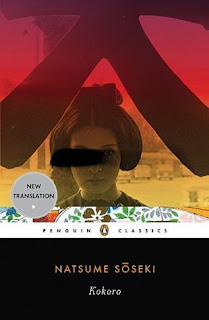Penguin Classics, 2010
originally published as こころ, 1914
translated by Meredith McKinney
238 pp
paperback
This novel would probably still be languishing on my shelves had it not been for an online friend who, reading it with a group, suggested I read it along with her. Great idea, because it also gave me the opportunity to read yet one more book I've owned forever that's just been languishing on my shelves unread.
Kokoro is,as I discovered, one of those novels where a second reading and a bit of research can completely change what you thought about it after the first time through. The second read was spurred by 1) discovering that a scholarly controversy had arisen over this book and 2) deciding to pick up and read another translation along with an introduction that explained said controversy. After much time to focus, think and absorb, well, the second time around actually clarified things I had trouble zooming in on after the first time.
(the second time through): trans. Edwin McClellan
Peter Owen Publishers, 2007
9780720612974
Structured in three parts, the novel opens with the narrator meeting and attaching himself to an elder man he calls Sensei, and is soon "yearning for the possibilities of all he had to offer." However, Sensei, who reveals that he distrusts humanity, is reticent to open up about himself, and our narrator often finds himself frustrated when, as he says, "I failed to gain what I sought from him in matters of the mind." However, Sensei also reveals that while he is "suspicious" of most people, he realizes that the narrator seems "too straightforward and open for that," and that Sensei, before he dies, wants to "have trusted just one person." If the younger man could "be that person, ... sincerely in earnest," from his heart, then he will reveal to him the story of his past and leave nothing out, but not right away, since "It requires a suitable moment." What he wants in return is left unspoken for the moment. Eventually the narrator will learn all, but not before part two, which finds him back home with his parents. While there because his father's health is failing, he abandons his own family at a critical moment due to some disturbing news from Sensei, which sets up part three, where all is revealed. Sadly, since everything sort of turns on the revelations in part three, I have to keep silent, since to tell would be to spoil, but this is actually the part where we come to understand Sensei and where we learn exactly what it is he expects from the narrator -- it isn't expressly stated in so many words, but trust me, it's there.
I wish I could make this post less cryptic, but there's a lot happening in this novel that a reader really needs to experience and sort out on his/her own. Look for thematic elements such as the formation of bonds, relationships, betrayal, individual vs. social responsibility, love, and above all, what it really means to bare or entrust one's soul/psyche to an outsider. What I will say is that after the second reading, Kokoro became an even darker book than it was the first time through, which I didn't think was possible. Interesting factoid: the use of hiragana for the word kokoro (こころ) rather than the kanji (心;) has, according to Tony Rayns, who wrote the liner notes for the dvd,
"the effect of diffusing the meaning, making it seem less clear-cut and more open to semantic and philosophical nuances. For Soseki, this was related to the sense that the Japanese national psyche was changing; he saw an emptiness in Japan's kokoro brought on by external pressures from the West and internal pressures to assimilate them."
Highly recommended for people who enjoy Japanese literature or for people who want to start reading Japanese fiction; it probably won't take everyone two readings, but I got a lot more out of it by doing it that way.
So, having read the novel I had to see the film as well. Big differences abound here, which are covered a bit in the dvd liner notes. As just one example, the movie "simplifies" Soseki's novel, "reorders its plot and eliminates some of its subtext while playing up the homosexual implications that are merely latent in the original." I have to say that since the subject doesn't actually come up labeled as such in the novel, I was surprised to see a scene in this movie where Shizu (Mrs. Sensei) starts wondering out loud whether or not there's some sort of attraction between her husband and Hioki (the novel's narrator, given a name here) which Hioki quickly denies with an "it's not what your thinking!" response. Much of the story is revealed through flashbacks, which I think really is the best way to have done it, since so much of the novel turns on what happened in the past. I've seen people criticize this approach used here, but I really don't see how else it could have been done. To tell it in a linear-narrative, chronological style would have wrecked things (as it would have in the novel as well). While the movie is certainly worth watching, the book is much, much better. There are movie critiques everywhere so I'll leave it there.
book & movie -- definite yesses, but definitely read the book first.
fiction from Japan





No comments:
Post a Comment
Say what you will, but at least try to be nice about it.